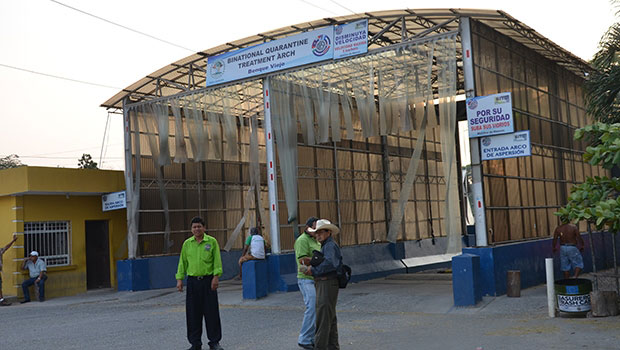BELIZE: Commonwealth Secretary-General Patricia Scotland has declared her intention to call an urgent meeting of the ministerial committee on the Belize-Guatemala border dispute.
The Commonwealth Ministerial Committee on Belize is expected to meet months before their scheduled September forum to discuss recent troubling developments in the boundaries disagreement.
The group of eight foreign ministers, chaired by Barbados, was created by heads of government in 1977. The decision to bring forward their meeting was made after Secretary-General Scotland met with Governor General Sir Colville Young, Prime Minister, Dean Barrow, Opposition Leader Jonny Briceño and other ministers and senior officials during a visit to the country.
Last week Prime Minister Barrow called a special meeting of the National Security Council to deal with the issue, and yesterday enforced a month-long restriction on movement in Belize’s portion of the Sarstoon River. This follows the death of a 13 year old Guatemalan boy, who was killed in the Adjacency Area.
In his meeting with the Secretary-General, Prime Minister Barrow said Guatemala’s continuing claim to Belize’s territory is an “existential threat to Belize”. He added that his country was “absolutely committed to resolving the dispute peacefully”.

Secretary-General Scotland reaffirmed the commitment made by the Commonwealth’s 53 governments at their 2015 summit, to fully support Belize’s sovereignty and territorial integrity.
She said: “I welcome the cooperation between Belize’s Government and Opposition on this issue, which is affecting their entire population, and commend the facility that they give to the hundreds of children who come from Guatemala daily to attend school in Belize. I have responded positively to a request from the government and the opposition to convene the Commonwealth Ministerial Committee on Belize, ahead of the scheduled September meeting.”
The territorial dispute between the two countries dates back centuries to Imperial Spain’s claim to all “New World” territories west of the line established in the 1494 Treaty of Tordesillas – a land distribution agreement between Spain and Portugal. An 1859 treaty established boundaries between Guatemala and Belize, but in the 1940’s Guatemala challenged the settlement.
The countries have been working with the Organisation of American States (OAS) towards a resolution since 2000. They both signed an agreement on a Framework for Negotiations and Confidence Building Measures, which includes a commitment to a set of guidelines to help the countries coexist peacefully while the border dispute is being resolved.
During her three-day visit to Belize, Secretary-General Scotland went to the border and met with the OAS team based there. She said: “I applaud the OAS for their invaluable confidence and peace-building initiatives and the encouraging results they have achieved, particularly in promoting cultural connections between Guatemalan and Belizean young people. I urge the international community to continue to resource this absolutely vital work.”
The Secretary-General, who also met with school children in Belize’s capital Belmopan, added: “I came to Belize to get a first-hand view of the country’s priorities, challenges and potentials, so I could better tailor Commonwealth cooperation and support. I spoke to the Prime Minister, government officials and the opposition about important initiatives to address climate change, support the rule of law and boost trade. But it is clear to me that the disagreement with Guatemala over border lines is the most pressing issue on the minds of the Belize people.
“When we visited Belmopan Methodist School we saw great talent and potential and a bright future. But we were also made aware of the anxieties of these young people. When we asked how the Commonwealth can help to improve their lives, one girl responded ‘give us peace with Guatemala’.
“I am urging both countries to heed to this plea for peace and return to the table for constructive and peaceful negotiations. The Commonwealth stands ready to do all in its power to support this process.”





